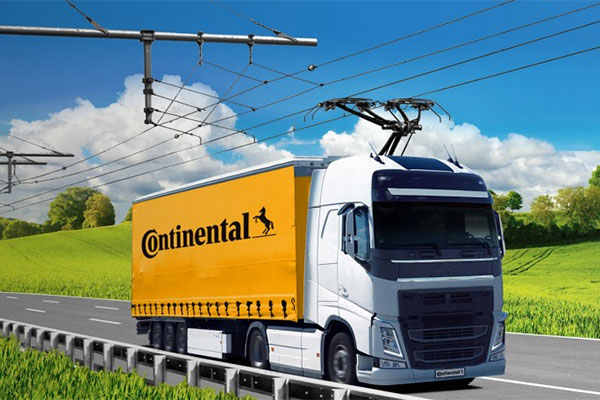 Image courtesy: Siemens
Image courtesy: Siemens
Siemens Mobility and Continental Engineering Services (CES) have partnered on the development and manufacture of pantographs for trucks, with the eHighway technology from Siemens Mobility supplying trucks with electricity via an overhead line.
The cooperation aims to electrify key stretches of highway-networks in Germany’s autobahn network with overhead contact lines and thus significantly reduce CO 2 emissions from trucks.
The new partnership combines expertise from two technology worlds: Siemens Mobility is a specialist in rail electrification, Continental Engineering Services is a development and production service provider for automotive technologies. The two companies will now pool their know-how to quickly achieve series production of truck pantographs.
“Highway freight transport plays a central role in the fight against climate change. In Germany, it accounts for one-third of all the CO 2 emissions in the transport sector. Truck manufacturers are pursuing various concepts to reduce this burden,” said Michael Peter, CEO of Siemens Mobility.
“With its eHighway, Siemens Mobility has already developed a ready-to-use technology for energy-efficient, cost-effective and emission-free truck transport that can be combined with other drive systems to become the backbone for fighting climate change in this sector.”
On the eHighway, trucks can operate completely electrically and at the same time charge their batteries without using fuel. “At CES, we’re applying the principle of rail electrification to the highway. The pantographs will be further developed and manufactured to meet automotive standards. The partnership between Siemens Mobility and Continental Engineering Services marks a major step toward achieving climate-neutral freight transport,” explained Dr Christoph Falk-Gierlinger, CEO of CES.
The decisive factor with the eHighway is that there´s no need to electrify complete autobahns. The “National Platform for the Future of Mobility”, an innovation initiative of the Federal Ministry of Transport, recommends that 4,000 kilometres of autobahns be equipped with overhead line systems by 2030, taking into account that roughly two-thirds of the fuel consumption in long-distance truck transport occurs on the most heavily travelled 4,000 kilometres of the 13,000-kilometer autobahn network.
If this network core can be electrified and trucks operating on the routes with electric drives (battery, hybrid, hydrogen) can be easily supplied with electricity, this would make a major contribution to climate protection.
Siemens Mobility’s eHighway is currently being tested on three public routes in Germany. – TradeArabia News Service









